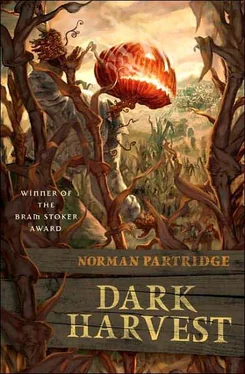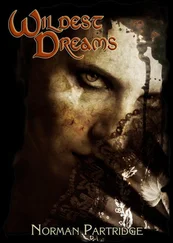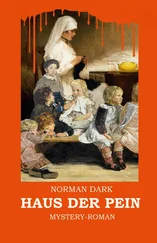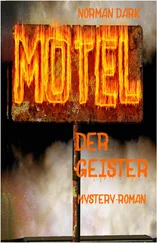Once he gets them down, all he can do is laugh.
It’s his laughter that allows him to turn his back on Jerry Ricks.
It’s his laughter that carries him inside the church.
So that was that. Dan carried Ricks’s riot gun up the back steps, unlocking the back door of the church with the preacher’s own key, thumb-popping his knuckles as he walked through the silence and took his place in the front pew.
And he sat there, and he waited.
And he sits there now.
No, you don’t have to ask Dan Shepard about hurt. And you don’t have to ask how he got here, or how he can sit in the quiet with a shotgun cradled in his arms while he waits for the thing that used to be his son. He knows why, even if the words don’t cross his lips. Dan’s not a stupid man.
Just because he can’t put a name to the furrows life carved in his hands doesn’t mean he can’t see where those ditches run. He knows well enough where they run. He even knows how those ditches were dug. Hell, sometimes he can almost see the shovels working. And tonight he hears those kids screaming in the streets, and he remembers what it was like to be sixteen… or seventeen… or eighteen, and run in their number. When he could believe the things that people told him, and he could chase after a dream until his heart pounded like it was ready to batter its way through his rib cage and take off on its own.
And that’s the way it was back then. For Dan and for all the guys he knew. You remember how it was, because you weren’t really any different. You could believe the things that people told you, too. Their words were gospel, and you trusted them. You believed because you were sixteen… or seventeen… or eighteen. You believed because your dreams had started running up against the Line like it was a brick wall that didn’t have a single crack. And you believed — most of all — because you had to. You needed to believe that someone could get out of this town, same way you needed to believe that that someone just might be you.
And you held on to that belief. You had to. You held on, and it saw you through the Run, saw you crowned the winner. And it saw you down the black road to a cleared patch of dirt in a cornfield, a spot where Jerry Ricks’s Smith & Wesson took all your dreams away.
That’s the way it was for you, but it wasn’t that way for everyone. If you were a guy like Dan Shepard, you walked a different path. When those three special birthdays ticked by and you came up short, the way Dan did… well, you found a way to live with it. You made your peace with your failure. If nothing else, you figured you’d had your chance. You took your cuts at the Line, and you fell short, so you really didn’t have anyone to blame but yourself. And, hey, it was a bitter pill to swallow, but at least you knew you took those cuts. At least you tried. And if you didn’t catch the brass ring, well, hell, it wasn’t the end of the world. It was just the way things turned out… it was the way things turned out for damn near everyone you knew.
That’s right. If you were like Dan Shepard, you weren’t alone. Plenty of other guys had to swallow that pill, and they kept on getting up every morning. So did you, if you were a guy like Dan.
You found a job. You filled up your days. And you filled up your nights, too. On one of them you found yourself with a girl who made you feel a little bit better about the way things were, and pretty soon you found yourself with that girl most every night. And a ring went on her finger, and the two of you carried around a couple of keys that matched the same front door, and at night you both found your way through it and closed that door behind you and, together, you waited for the morning to come.
That’s the way it was for you if you weren’t a winner. And it wasn’t so bad, really. Even when you finally started to figure things out, it wasn’t so bad, because you still had each other when that door closed at night, and maybe if you were really lucky you had something else to go along with that, something that was a little bit of both of you, something that allowed you to push away the truth just a little bit longer.
But by the time your first kid was out of diapers, you couldn’t run from the truth anymore. You knew about that cornfield. You knew about all those young men buried in that black soil. Once you’d thought those poor bastards had gone somewhere better, when they really hadn’t gone anywhere at all. And now you thought about them sleeping down there in the dirt as you stared up at the ceiling in the middle of the night. And you thought about them every time you heard your own boy cry out as he woke from a nightmare in his tiny little bedroom down the hall.
And you told yourself that you really shouldn’t worry so much, that the odds are really in his favor. They only took one boy a year. And it wasn’t your decision. It wasn’t your call. It was only the way it was, and you really didn’t have anything to do with it at all. It was those steel-rail bastards in the Harvester’s Guild who kept that trainload of misery rolling year after year after year, and no one could stand up to them.
You told yourself that, but it didn’t slow your thumping heart. Your fear was there between the pulse beats, no matter what you said. And it banged at you, because, hell, you weren’t sixteen, or seventeen, or eighteen anymore. You knew better than to believe the lies that people told you. You knew better than that because you’d learned there were other things besides dreams that could make your heart pound like it was ready to batter its way through your rib cage and take off on its own.
Turned out it didn’t matter what you’d learned, because the years swept by regardless. And one day, your boy turned sixteen. And one night, he stepped through your front door. And you let him go, knowing what you knew. And you were there when he hit the finish line, and you were there when he was crowned a winner, and it didn’t matter at all that you tried to stop it, because by then there was no way to stop it.
What mattered was that you made it home that night, and your boy didn’t. What mattered was that you got up the next morning, and he didn’t have the chance. And that’s the way it was from there on out — night after night, morning after morning. It turned out the whole deal was really as simple as that.
And now you sit in a church with a shotgun cradled in your arms, staring down at your hands, knowing full well all the things you did with them and all the things you didn’t do. You see the ditches there in your skin, and you can almost hear the shovels working. And you wonder what those hands will do this night, and you wonder how bad they’ll ache tomorrow morning.
Outside, young men are screaming in the streets.
You listen to the sound for a few long minutes… and then the sound drifts away.
In its place comes a smell that drifts through the open back door.
The raw stink of smoke.
You walk to the front door of the church and open it. Boys are running down Main, toward Oak. A couple miles to the north, flames score the sky.
Sirens scream in the night. A fire truck roars by, and a police cruiser follows. But you don’t think of the sirens… or the truck or the car… or the fire.
You think of your son, beating the hell out of the odds just a year ago.
You think of your son, beating the hell out of the odds tonight.
You feel it, down deep, in your bones. You know he’s coming. Your boy. Jim. The son you let down. He’s coming here… and he’s coming soon. You close your eyes and you can see him — the heavy church door creaks open like a castle drawbridge in an old horror movie, and that misshapen thing from the cornfield steps through the gap. You close your eyes and you can see him — a little kid reaches for a doorknob in a tiny three-bedroom house, and that pink-faced baby you once held in your arms steps out into the world on his own for the very first time.
Читать дальше










